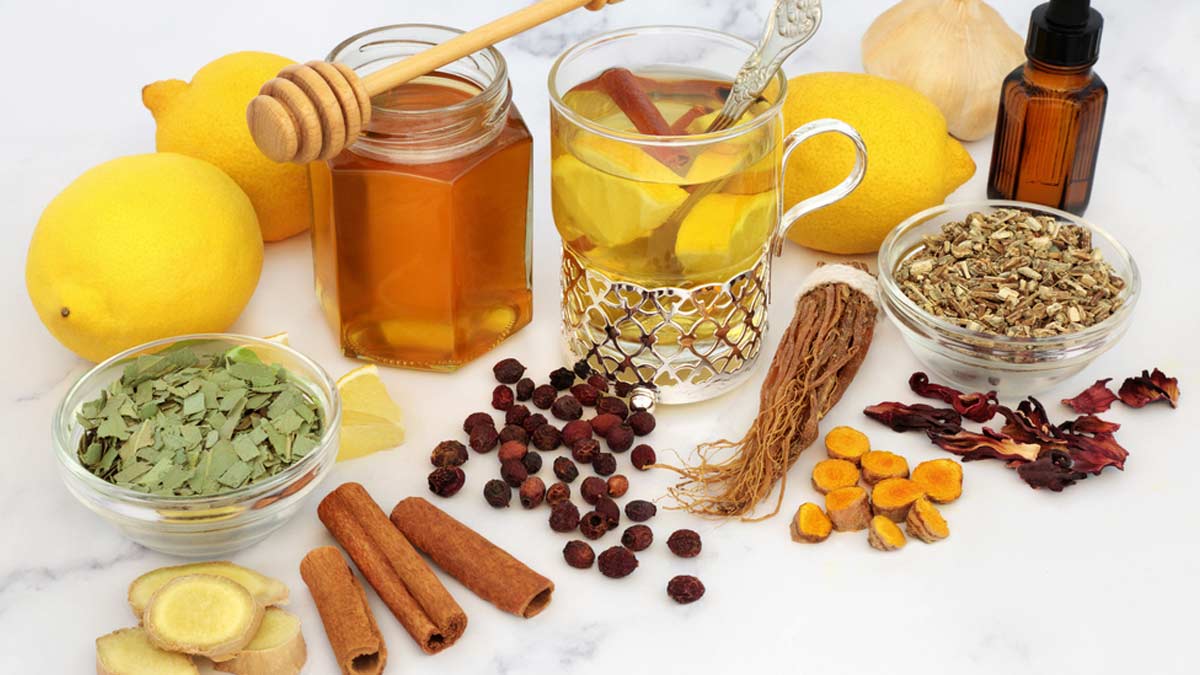
As winter sets in, the persistent cough becomes a common woe. Instead of relying on over-the-counter medications, consider the magic of herbs. Many herbs boast immunomodulatory and anti-inflammatory properties, fortifying the body's defences and promoting overall health. Dive into the world of herbal remedies to alleviate cough and enhance your well-being.
Table of Content:-
Best Herbs For Winter Cough
If you are dealing with a stubborn winter cough, then the following herbs are all that you need.
Tulsi (Holy Basil)
Tulsi has antimicrobial properties to combat respiratory infections and soothe the throat. It also supports the immune system and reduces stress. To deal with cough, it is advised to infuse tulsi leaves in hot water for a soothing tea or add to dishes for a flavorful twist.

Trikatu (Black Pepper, Long Pepper, Ginger):
The use of these three herbs alleviates congestion, improves digestion, and acts as an expectorant. Its use also enhances metabolism and detoxification. For best results, incorporate ground black pepper and ginger into meals. Brew a tea with long pepper for added benefits.
Yashtimadhu (Liquorice)
Liquorice has anti-inflammatory and soothing properties that help alleviate throat irritation and cough. Its antioxidant properties reduce oxidative stress and aid digestion. Simply chewing on liquorice root or having liquorice tea in moderation can help one see good results.
Also Read: Take These 9 Natural Herbs To Combat Viral Fever
Pippali (Long Pepper)
Long pepper acts as a bronchodilator, and decongestant, and strengthens the immune system. It is highly effective in respiratory issues like bronchitis. It is advised to include long pepper in culinary preparations or consume it in powdered form with honey.
Kantakari (Yellow Nightshade)
This herb relieves productive cough, breaks down mucus, enhances lung function, and improves overall respiratory health. To prepare Kantakari decoction, simply boil the herb in water, and consume it in small quantities.
Vasaka (Malabar Nut Tree)
Vasaka is known to have expectorant and bronchodilatory properties which can help clear respiratory congestion. It supports healthy breathing and strengthens lung tissues. For best results, make Vasaka tea by steeping the leaves in hot water and consuming it as needed.
Pudina (Peppermint)
Pudina has antispasmodic and decongestant properties, that provide relief from cough and congestion. It also aids digestion and enhances mental alertness. It can be easily brewed as tea or added fresh to salads and beverages.
Haldi (Turmeric)
Turmeric has antimicrobial and anti-inflammatory properties that alleviate cough and support immune health. It is also known for aiding digestion and reducing overall inflammation. For best results, add turmeric powder to curries, soups, or warm milk for a healing concoction.
Also Read: Breathe Easy: Herbs to Improve Respiratory Health Amidst Delhi's Air Pollution
Adrak (Ginger)
Ginger is known to have expectorant and throat-soothing properties that help relieve cough and congestion. It also improves digestion and boosts the immune system. It is advised to include grated ginger in teas, and soups, or infuse it in hot water for a soothing drink.
While these herbs offer numerous benefits, it's crucial to consult with an Ayurvedic practitioner or healthcare professional before incorporating them into your daily routine. Proper usage and dosage ensure a safe and effective integration of these magical herbs.
Bottomline
As winter cough becomes a seasonal challenge, turn to nature's remedies for relief. The magical herbs discussed not only address cough symptoms but also promote overall well-being. Embrace the power of natural remedies and consult with experts for harmonious integration into your winter routine.
Also watch this video
Read Next
After Heavy Rain In North India, IMD Issues Cold Wave Warning: These Ayurvedic Soups May Protect You
How we keep this article up to date:
We work with experts and keep a close eye on the latest in health and wellness. Whenever there is a new research or helpful information, we update our articles with accurate and useful advice.
Current Version